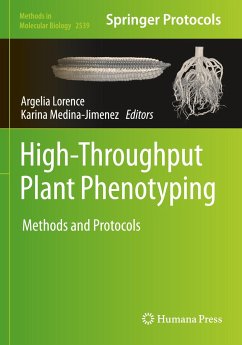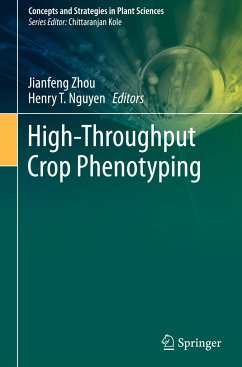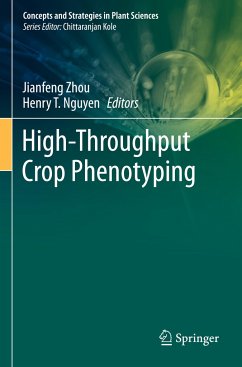
High-Throughput Plant Phenotyping
Methods and Protocols
Herausgegeben: Lorence, Argelia; Medina Jimenez, Karina

PAYBACK Punkte
68 °P sammeln!
This volume looks at a collection of the latest techniques used to quantify the genome-by-environment-by-management (GxExM) interactions in a variety of model and plant crops. The chapters in this book are organized into five parts. Part One discusses high-throughput plant phenotyping (HTPP) protocols for plants growing under controlled conditions. Part Two present novel algorithms for extracting data from seed images, color analysis from fruits, and other digital readouts from 2D objects. Part Three covers molecular imaging protocols using PET and X-ray approaches, and Part Four presents a co...
This volume looks at a collection of the latest techniques used to quantify the genome-by-environment-by-management (GxExM) interactions in a variety of model and plant crops. The chapters in this book are organized into five parts. Part One discusses high-throughput plant phenotyping (HTPP) protocols for plants growing under controlled conditions. Part Two present novel algorithms for extracting data from seed images, color analysis from fruits, and other digital readouts from 2D objects. Part Three covers molecular imaging protocols using PET and X-ray approaches, and Part Four presents a collection of HTPP techniques for crops growing under field conditions. The last part focuses on molecular analysis, metabolomics, network analysis, and statistical methods for the quantitative genetic analysis of HTP data. Written in the highly successful Methods in Molecular Biology series format, chapters include introductions to their respective topics, lists of the necessary materials andreagents, step-by-step, readily reproducible laboratory protocols, and tips on troubleshooting and avoiding known pitfalls.
Cutting-edge and practical, High-Throughput Plant Phenotyping: Review and Protocols is a valuable resource for both novice and expert researchers looking to learn more about this important field.
Chapter 21 is available open access under a Creative Commons Attribution 4.0 International License via link.springer.com.
Cutting-edge and practical, High-Throughput Plant Phenotyping: Review and Protocols is a valuable resource for both novice and expert researchers looking to learn more about this important field.
Chapter 21 is available open access under a Creative Commons Attribution 4.0 International License via link.springer.com.












